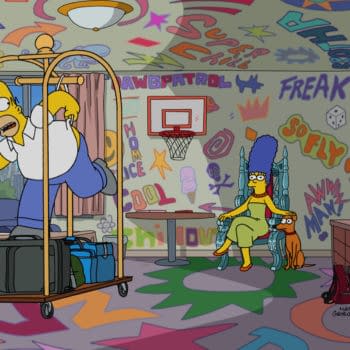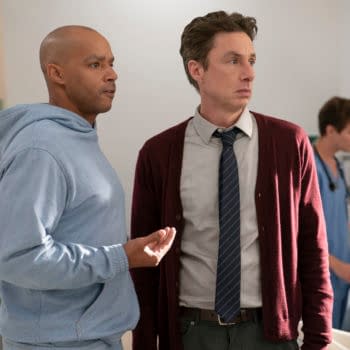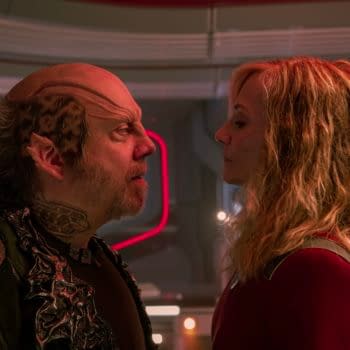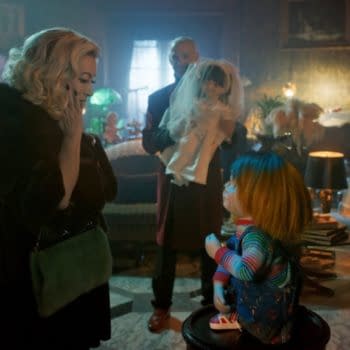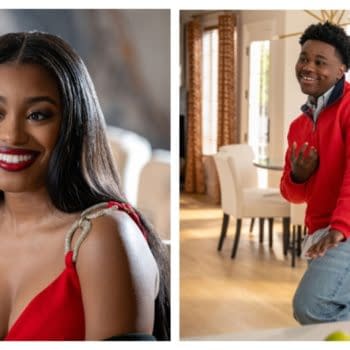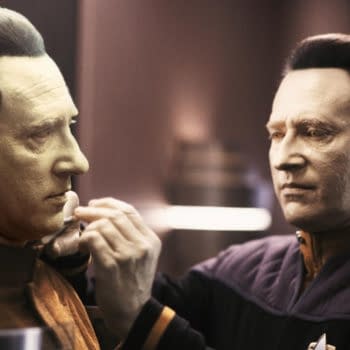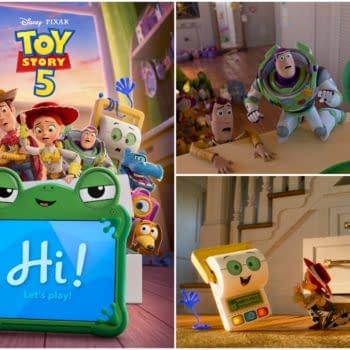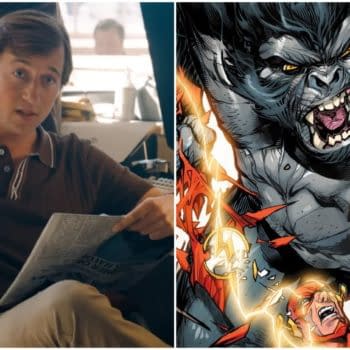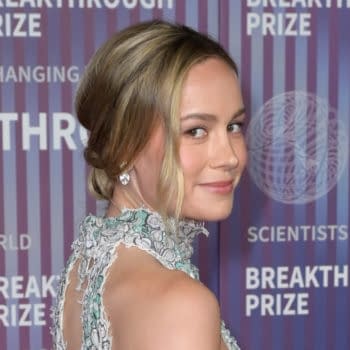Posted in: Exclusive, Interview, Movies | Tagged: Asher Angel, Cineverse, fiona dourif, interview, Lance Henriksen, Nick Lyon, On Fire, Peter Facinelli
On Fire Star Peter Facinelli on Unexpected His Creative Role Expansion
Peter Facinelli (Supergirl) spoke to Bleeding Cool about his latest survival thriller in Cineverse's On Fire, reluctantly co-directing & more.
Peter Facinelli prides himself on his versatility, but he wasn't expecting to go beyond becoming the lead in Cineverse's survival thriller On Fire. In this instance, he shared directing credit with Nick Lyon, who co-wrote the script with Ron Peer. Not far removed from his run as the villain Maxwell Lord in The CW's Supergirl, Facinelli kept busy in TV and film with memorable roles on Magnum P.I., S.W.A.T., American Odyssey, Glee, and Nurse Jackie. Inspired by true events, On Fire follows the story of an ordinary man (Facinelli) who finds his world suddenly torn apart as devastating wildfires rip through the surrounding countryside. With precious moments ticking by, he must flee with his son (Asher Angel) and pregnant wife (Fiona Dourif) if they hope to survive Mother Nature's rapid forces. As part of the SAG-AFTRA interim agreement, Facinelli spoke to Bleeding Cool about how the film's environmental message resonated with him, how it became a labor of love to first responders, reluctantly taking over production and building a rapport with his co-stars.
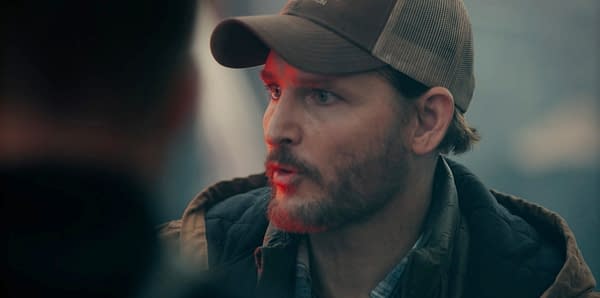
On Fire: A Story of Family, Survival, and Perseverance
Bleeding Cool: What was the inspiration for 'On Fire?'
Facinelli: I had read the script and thought, "This is a prevalent topic." It's been in the news a lot with the level of fires that have been happening. We had the Australian fire a few years back, but many others. It seems like every other weekend, there appears to be a new fire. I thought, "Look, we don't need a film that creates more awareness for fire. We have enough fires going on that are creating awareness of the issue in and of itself." Interestingly, this film gives an inside perspective and a look at what some of the victims are going through.
It was based on true events, and I had many interesting takeaways from this film. On the outside, it's this family survival film, maybe a throwback to this family survival film that we've seen. On the inside, it felt more like this intimate story because this movie has minimal characters. For the better part of the movie, you're with this family. It felt good to be a part of this family going through this experience to understand better and have more compassion.
When you see it on the news and what other people are going through, you're like, "I feel like I know what it's like to go through that." Maybe you could be more giving, and when you see it somewhere else, you could perhaps give pause, as a society, to go, "How can we come together to fix this issue happening so often?" There are many reasons why I did it, but the bigger issue for me was I was interested in the topic they talked about, and then I was interested in the journey that these characters went on and the takeaways that the film gave in a song.
By the film's end, we celebrate first responders with firefighters and 911 operators and credit them for all their hard work. We try to leave the movie with hope with a message of rebirth, how we can fix this issue, and give positive examples of how we can improve this issue. On the family side, at the beginning of this movie, my character (Dave) is under immense stress, working paycheck to paycheck. He's got a kid on the way and a sick dad (Lance Henriksen). He's got a new company that might fail. This event happens where all those mountainous, stressful things become anthills compared to "How am I going to get through this night? How can I survive this?" His perspective shifts at the end of this movie, knowing that no matter what their family goes through, from that point on, they know they'll be okay because they have each other. That's a beautiful takeaway. There are a lot of little messages throughout the film and the bigger, broader messages. Those are the reasons why I wanted to be a part of it and why it's a fun watch.
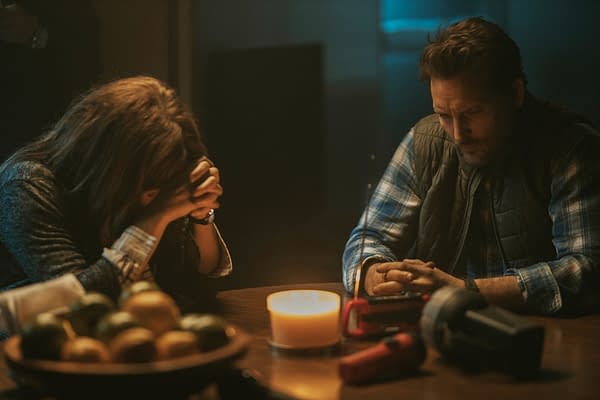
We're not far off the anniversary of 9/11, given the timing. Did you know any first responders to provide a perspective or consult on the film?
I have friends and family that are in the fire department. I went through 9/11, and I know a lot of friends who've lost their dads because of it. That was an important message for me to get out there, especially the 9/11 operators, because they aren't often talked about or shown how they're heroic. You see firemen, how they're heroic, busting into a building, save the people, and they're battling. These firefighters, police, staff, and doctors are exciting enough.
When you have an operator, you don't get to see their jobs or understand the pressures, and the young girl (Ashlei Foushee) who's been on the job for a couple of weeks in a sleepy town, suddenly, she's at ground zero, and people are bombarding her with calls. She's trying her best to help, failing, and feeling like a failure, not knowing what to do. She's so stressed, and there are moments in there where I walk away, and there's a line that her supervisor says, "Look, you can't save everybody. All you could do is try to help one family at a time." It's such a heartbreaking message, but it's true in and of itself.
It doesn't make her feel better, but at least she can try to get that one family safe. If she can get that one safe, she can get another. What he's saying is, "You can't take it on because that one person you can't help, and then all of a sudden, the phone goes dead, and you got to help this person." Watching that is interesting compared to a family in need because you're watching somebody who wants to help but is frustrated. Another family who's like, "Please help me!" The arc is she does to get this one family through this, and she gets at least have that. That's an interesting, distinct takeaway.
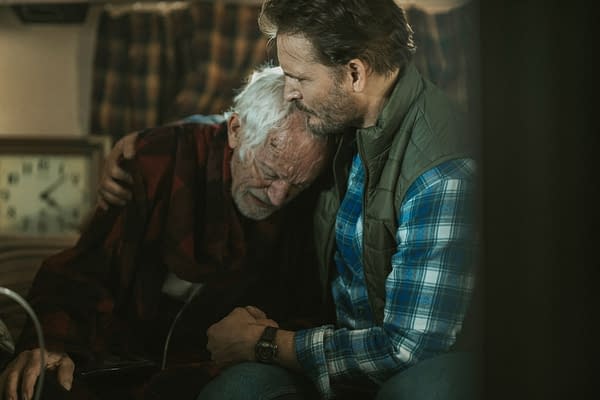
Is it easier for you when you're learning multiple hats on a project, or is it easier to dedicate to one role during production?
Whether I'm acting, directing, or writing, it becomes overwhelming if you look at it as the sum of its parts. If you try to eat the whole cake, it's overwhelming. If you have one slice at a time, then it's a lot easier. With this film, I never signed up to direct. I was supposed to come on board and star as the lead in the movie. When I got the set, Nick [Lyon] was wonderful. He had a great script that we continued to work on collaboratively. We were able to continue to elevate the scenes and work on setups, payoffs, and themes. We had mutual respect as filmmakers. We were sitting there going. I loved working in that collaborative sphere with him, and then he got sick. It was devastating because you said, "You're losing the ship's captain here, but we're so far out at sea, and we can't go back to port." Nick, at that point, we couldn't shut down, but he trusted me enough to know that we were on the same page of the movie we wanted to make.
[Nick] handed the autonomy and said, "Can you finish up?" and I did. We took that collaborative spirit into the editing room and worked hard to make the movie. At the end of the day, I didn't even want to take any directing credit for it, much less co-directing credit. Nick was like, "Look, it feels like more our movie than my movie or even your movie. Why don't we celebrate that instead?" I said, "Great." We took a co-directing credit and celebrated that we could work together to create this piece. I'm proud of what we were able to accomplish.
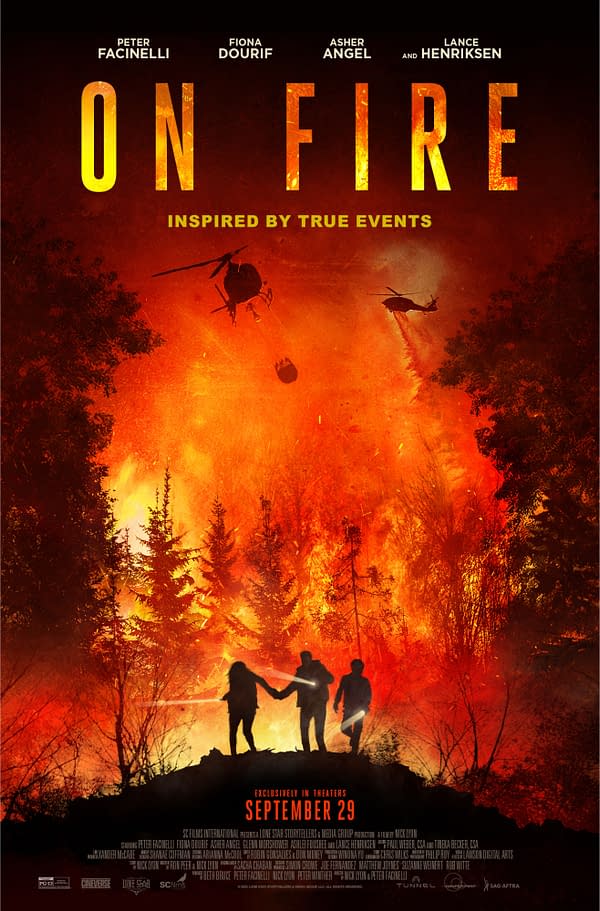
Can you discuss the chemistry and rapport you built with Fiona, Asher, and Lance [Henriksen]?
They're all so wonderful. I must give them a lot of credit for a film like this. The challenge for an actor is that we didn't have practical fire on the film sets. We were in a forest. We weren't allowed to set fire to the forest, nor did we want to. The last thing we want to do is start a fire. When we're making a fire to say, "Let's stop wildfires." We were overly cautious, and in the film's spirit, we were like, "No fires on set."
There was one day we did a controlled fire. We had to light a stuntman on fire in the first team. It was a controlled blaze. Other than that, there was a lot of greenscreen acting where we had the lighting effects Nick brought to the table, and the smoke effects created the atmosphere. Our job as actors and the rest of the cast was to respond to that. As an actor, it's tough to look up at a tree and go, "The floating embers up there, or have the other actors running from a burning house when the house isn't burning." To be in this atmosphere where we looked to each other and go, "Look, we have to come 100% here, we can't have as it, and you got to in those situations everything's got to feel like the stakes are so through the roof high, being able to look into each of their eyes, and know that they and I were feeling it.
We were there to elevate each other in our performances. It felt right, and they're good actors. It would have been tougher if you were working with actors who don't commit or aren't as good because it brings you down. One of the wonderful things that I found was when I had to take over for a sick director as an actor. I've always been in service to the director.
When I finish a scene, I'm always like, "Hey, was that good? Is that what you wanted?" It is there. You can try this, and you bring your ideas to the table. You always want to feel like I gave them the pieces they need because it's their medium; I'm there to serve them. When there was no director, and Nick got sick, then there was nobody for me to answer to. I became the person I had to service. It was like, "I know what I need and what the scenes are about. I know the energy, so it's less about me going, "Was I good at that?"
It became, "I need this is what I need from everybody?" It became about giving to the other actors as much as possible to help while building everybody up. The more I gave, the better I was. I want to take that into my following jobs and say, "Give as much as I can in the scenes and not worry about what I'm doing. That's how it should be." It took me all this time to learn it because I wanted to please some other person; it should be that you give and you do your job. If they need something different, they'll let you know.
On Fire, which also stars Glenn Morshower and Ross McCall. The film is currently in theaters.






